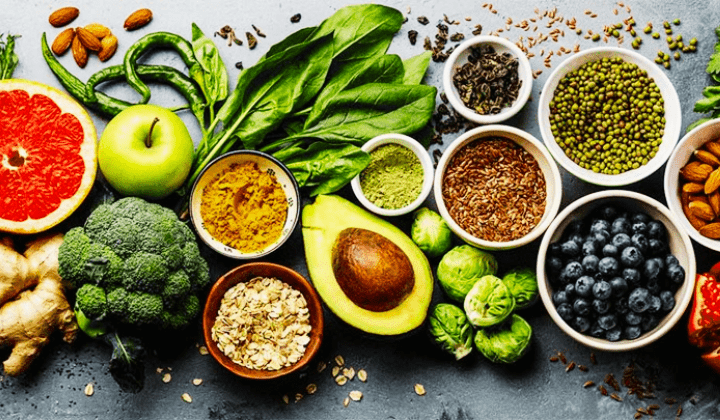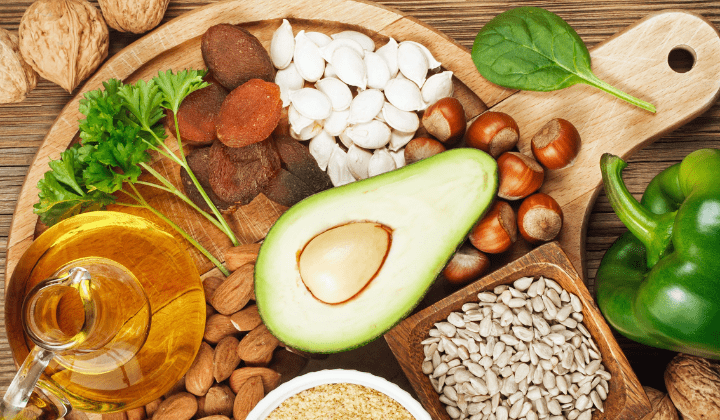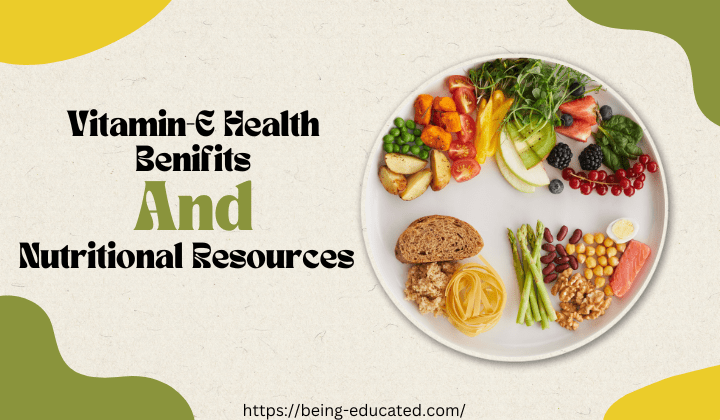In this article, we will go over ” wellhealthorganic.com:vitamin-e-health-benefits-and-nutritional-sources” in depth. Vitamin E is the most important lipid-soluble component of the antioxidant defense system in the cell. It can only be obtained from food. It has a range of important functions in the body due to its antioxidant action.
Numerous conditions and diseases, including cancer, aging, arthritis, and cataracts, have been linked to oxidation; vitamin E has been displayed to be effective against these. Vitamin E can help to prevent platelet hyper aggregation, which can contribute to atherosclerosis; it also helps to prevent the formation of prostaglandins like thromboxane, which cause platelet clumping.
Vitamin E is essential for preserving health and well-being because it facilitates a variety of cellular activities. So, Vitamin E can protect cells from oxidative damage produced by free radicals due to its antioxidant capabilities and fat solubility. Vitamin E also helps the immune system function properly and supports healthy skin and hair, among other things.
See Also: Private: Discover Accurate Therapy Information with OPGuide in Korea
Introduction to wellhealthorganic.com:vitamin-e-health-benefits-and-nutritional-sources
Vitamin E is a fat-soluble substance that is essential for maintaining good health. It is a powerful antioxidant that protects the body against free radical damage. Free radicals are unstable chemicals that can cause cell damage and eventually lead to chronic diseases like cancer, cardiovascular disease, and Alzheimer’s.
Vitamin E, in addition to its antioxidant qualities, boosts immunity and helps control gene expression. It has been demonstrated that it improves skin health by lowering inflammation and guarding against UV damage. Furthermore, it can help in the prevention of age-related macular degeneration and cognitive decline.
Nuts, seeds, vegetable oils, leafy greens, and fortified cereals are all sources of vitamin E. Some people, however, may need supplementation to meet their daily requirements. Before beginning any new supplements or dramatically altering your diet, consult with your doctor.

Health Benefits according to wellhealthorganic.com:vitamin-e-health-benefits-and-nutritional-sources
wellhealthorganic.com:vitamin-e-health-benefits-and-nutritional-sources, Vitamin E is a necessary component that acts as an antioxidant in the body. Because it is a fat-soluble vitamin, it can be stored in the body’s fatty tissues and used as needed. Adults should consume 15 milligrams (mg) of vitamin E per day, which can be found in a variety of foods such as nuts, seeds, leafy greens, and vegetable oils.
One of the most important health benefits of vitamin E that is already discussed is its ability to protect cells from free radical damage. Free radicals are unstable chemicals that can harm healthy cells and accelerate the aging and disease process. Vitamin E helps in the neutralization of free radicals, minimizing their negative effects on the body.
Vitamin E has been linked to a variety of potential health benefits, including improved skin health, increased immunological function, and a lower risk of chronic diseases such as heart disease and cancer. While more research is needed to fully understand these benefits, including vitamin E-rich foods in your diet can help ensure you get enough of this important nutrient.
What are the Health Benefits of Vitamin E?
Similarly, Vitamin E is an antioxidant that protects the body from the detrimental effects of free radicals. The following are some of the health benefits of vitamin E:
- According to a study, vitamin E may reduce the risk factors for heart disease such as high cholesterol and blood pressure.
- Children and adults who take vitamin E may have better lung health and less asthmatic symptoms.
- Women suffering from dysmenorrhea or endometriosis may discover that vitamin E reduces menstrual cramps and pelvic pain.
- Vitamin E may help in the treatment of non-alcoholic fatty liver disease, which is an accumulation of fat in the liver in persons who do not consume a lot of alcohol.
- According to research, maintaining enough vitamin E levels may help prevent cognitive decline.
- Vitamin E may reduce inflammation and enhance the immune system in older persons.
Recommended: The Importance of B Pharmacy in Today’s Healthcare system
What are the nutritional sources for Vitamin E?
Vitamin E levels are high in the following foods:
The seed and nut supply:
Nuts and seeds are among the most abundant vitamin E food sources. Almonds, sunflower seeds, and hazelnuts, to name a few, are excellent examples of nuts and seeds.
Vegetables with leaves:
Vitamin E is high in leafy green vegetables. In this area, spinach, kale, and collard greens are among the best.
Oils extracted from vegetables:
Among the vegetable oils high in vitamin E are safflower oil, wheat germ oil, and sunflower oil.
Nutritionally Enhanced Cereals:
Some breakfast cereals have vitamin E added, making them a more nutritious choice.
Why Is Vitamin E So Important for Your Health?
wellhealthorganic.com:vitamin-e-health-benefits-and-nutritional-sources
Vitamin E has well-known antioxidant properties. Vitamin E is an antioxidant that helps in the prevention of cell damage and, as a result, chronic diseases such as cancer, heart disease, and Alzheimer’s. The following are some major reasons for vitamin E’s importance:
Helps the body’s defenses:
Vitamin E helps in the maintenance of a healthy immune system. According to studies, vitamin E improves immune cell activity, making the body more resistant to infections and illnesses.
Helps maintain healthy hair and skin
Only a diet high in vitamin E can keep skin and hair healthy. It protects the skin from the sun and other harmful substances while also nourishing it. Vitamin E is beneficial in reducing hair loss and maintaining healthy hair.
Decreases the potential for developing chronic diseases:
According to research, vitamin E may help reduce the risk of getting serious illnesses such as cancer, heart disease, and dementia. According to one study, high levels of vitamin E consumption are associated with a lower chance of getting Alzheimer’s disease.
See Also: how many pushups should I do a day
How Much Vitamin E Do You Require: Dosage, Safety and Precautions
Wellhealthorganic.com:vitamin-e-health-benefits-and-nutritional-sources states that the recommended daily allowance of vitamin E changes with age and gender. The National Institutes of Health recommend the following daily averages:
- Babies and kids: 6-15 mg/day
- For adults, a daily dose of 15 mg is recommended.
- Pregnant women should take 15 mg daily.
- Women should take 19 mg per day during lactation.
While vitamin E is usually considered safe when taken in the recommended dosages, some precautions should be taken before taking supplements. High doses of Vitamin E, for example, can raise the risk of bleeding in people who use blood-thinning drugs like warfarin. Individuals with liver disease should also avoid taking high doses of Vitamin E because it can cause liver damage.
It’s also important to remember that not all Vitamin E supplements are made equal. In terms of health advantages, synthetic versions such as dl-alpha-tocopherol may not be as beneficial as natural forms such as d-alpha-tocopherol. As a result, before beginning any sort of Vitamin E supplementation, it is best to consult with a healthcare expert.
It’s important to note that too much vitamin E might be dangerous. Adults should not consume more than 1,000 milligrams (mg) of vitamin E per day. If you exceed this quantity, you may develop excessive bleeding and other health concerns.

What Are the Side Effects of Getting Too Much Vitamin E?
It is important to include vitamin E in your diet. However, excessive consumption of this vitamin can be harmful to one’s health.
Consider the following side effects of taking too much vitamin E:
- Raises the chance of a hemorrhagic stroke.
- Muscle weakness
- Fatigue
- Nausea
- Increases the risk of bleeding
- Diarrhoea
- Headache
- Increases skin rashes
How Vitamin E can improve general health and protect against diseases?
wellhealthorganic.com:vitamin-e-health-benefits-and-nutritional-sources. Several studies have shown that getting enough Vitamin E may help prevent diseases like cancer, Alzheimer’s, and Parkinson’s. Antioxidant vitamin E helps in preventing free radical damage to cells. Vitamin E may help lessen the incidence of prostate, lung, and colorectal cancers, according to a study.
Alzheimer’s disease is a neurological condition that causes memory loss and mental decline. According to research, those who have higher levels of Vitamin E in their diets or blood have a lower risk of getting Alzheimer’s disease. Similarly, Parkinson’s disease is a neurodegenerative condition in which oxidative stress plays an important role. According to research, antioxidants such as Vitamin E may help protect against the damage produced by oxidative stress.
While getting enough Vitamin E through diet or supplements may be beneficial for overall health and disease prevention, it should not be used as the sole treatment for any medical condition. A well-balanced diet rich in numerous nutrients, together with other healthy lifestyle behaviors, can help to maintain maximum health and well-being.
One of the most important advantages of vitamin E is its ability to promote cardiovascular health. According to research, this nutrient can help lower blood pressure and reduce artery inflammation, both of which are important risk factors for heart disease. Vitamin E may also help in the prevention of blood clots by improving circulation and preventing platelets from sticking together.
Vitamin E, in addition to its cardiovascular benefits, can promote healthy skin and hair. This nutrient is well-known for its moisturizing properties as well as its ability to protect against UV rays. It has also been shown to improve skin elasticity and wrinkle appearance over time. Overall, incorporating vitamin E sources into one’s diet or taking supplements may result in improved physical well-being while avoiding potential diseases!
Is vitamin E oil good for you?
Vitamin E can be made into topical oil. Some claim it helps with flaking, itching, and dryness. However, there isn’t a lot of proof that vitamin E oil is more beneficial than oral supplements.
Vitamin E oil, on the other hand, can be used as a natural preservative in goods such as lip balms.
While additional research is required, some studies have yielded promising results. According to a 2016 study, topical vitamin E improved psoriasis symptoms. It may help minimize your risk of scarring because it is an excellent moisturizer.
Bottom Lines
Finally, we discussed wellhealthorganic.com:vitamin-e-health-benefits-and-nutritional-sources in detail. Including Vitamin E in your diet is important for good health. Vitamin E has a wide range of benefits that can improve your general well-being, from its antioxidant capabilities to its role in immunological function and skin health.
Incorporating foods high in Vitamin E into your daily diet is one way to ensure adequate intake. Nuts and seeds, leafy greens, avocados, and whole grains are a few examples. You could also consider taking a high-quality supplement.
However, it’s important to remember that while Vitamin E is beneficial for most people in appropriate doses; excessive amounts can be harmful to some people. As a result, before making any significant changes to your food or supplement routine, always consult with a healthcare expert.
Participate in the Discussion: https://being-educated.com/community/
FAQs | Wellhealthorganic.com:vitamin-e-health-benefits-and-nutritional-sources
What are the benefits of vitamin E and where can I get it?
Vitamin E has antioxidant properties. Antioxidants are compounds that may protect your cells from the impacts of free radicals, which are molecules produced by your body when it digests food or is exposed to tobacco smoke or radiation. Free radicals may be involved in cardiovascular disease, cancer, and other conditions.
What are the health benefits of eating E?
Vitamin E is necessary for the proper operation of your brain, eyes, immune system, and heart. The nutrient may help to avoid heart disease and vision problems, as well as improve cognitive performance and even fight against certain types of cancer.
Can I directly apply vitamin E capsules to my face?
Vitamin E is best known for its skin health and beauty advantages. It can be applied directly to the face to reduce redness and make your skin look younger. (wellhealthorganic.com:vitamin-e-health-benefits-and-nutritional-sources)
How Can You Tell If You Lack Vitamin E?
There are some easy techniques to check if you have a deficiency in vitamin E if you are worried about your intake. A blood test that analyses the body’s circulation of this fat-soluble vitamin can be requested by your doctor.
Is it possible to consume too much vitamin E?
While moderate amounts of vitamin E in the diet are generally considered safe for most people, high doses in supplement form can be dangerous. More than 1,000 mg per day can raise the risk of bleeding or blood clots. Before beginning any new supplement regimen, consult with your healthcare professional.
Does wellhealthorganic.com:vitamin-e-health-benefits-and-nutritional-sources benefit your hair?
Yes, vitamin E is good for the lipid layer of your hair and gives your hair luster. It also maintains a healthy scalp by reducing oxidative stress.
What are the advantages of vitamin E oil?
Here are the top benefits of vitamin E oil:
- Eczema treatment
- Skin is moisturized and sunburn is avoided.
- Improves nail health
- Scars are reduced in appearance.










